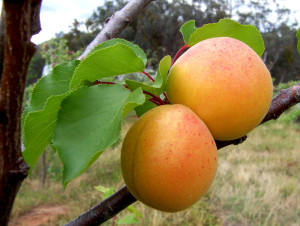Prunus armeniaca (“Armenian plum”), the most commonly cultivated apricot species, also called ansu apricot, Siberian apricot, Tibetan apricot, is a species of Prunus, classified with the plum in the subgenus Prunus.
Contents
Uses
Seeds or kernels of the apricot grown in central Asia and around the Mediterranean are so sweet, they may be substituted for almonds.The Italian liqueur amaretto and amaretti biscotti are flavoured with extract of apricot kernels rather than almonds. Oil pressed from these cultivar kernels, and known as oil of almond, has been used as cooking oil. Kernels contain between 2.05% and 2.40% hydrogen cyanide, but normal consumption is insufficient to produce serious effects
Benefits
- Fresh fruits are low in calories, composing just 50 calories per 100 g weight. Nonetheless, they are rich source of dietary fiber, antioxidants, vitamins, and minerals. The fruits are enriched with numerous health promoting phyto-chemicals; that helps prevent heart disease, reduce LDL, (“bad cholesterol”) levels and offer protection against cancers.
- Apricots are excellent sources of vitamin-A, and carotenes. 100 g fresh fruits carry 1926 IU or 64% of daily-required levels of vitamin A. Both of these compounds are known to have antioxidant properties and are essential for vision. Vitamin-A is also required for maintaining healthy mucusa and skin. Consumption of natural fruits rich in carotenes helps protect the body from lung and oral cavity cancers.
- Fresh fruits contain vitamin-C, another natural anti-oxidant. Vitamin-C helps the body develop resistance against infectious agents and scavenge harmful oxygen-free radicals.
- They are an also good source of minerals such as potassium, iron, zinc, calcium and manganese. Potassium is a heart-healthy mineral; an important component of cell and body fluids that help regulate heart rate and blood pressure.
- The total anti-oxidant or ORAC value of raw apricots is 1115 umol TE/100 g. Much of this in these fruits comes from some important health promoting flavonoid poly phenolic anti-oxidants such as lutein, zea xanthin and beta cryptoxanthin. Altogether, these compounds act as protective scavengers against oxygen-derived free radicals and reactive oxygen species (ROS) that play a role in aging, cancers and various disease process.
- Further, zea-xanthin, a carotenoid selectively absorbed into the retinal “macula lutea” in the eyes where it is thought to provide anti-oxidant and protective light-filtering functions. Thus, consumption of fruits like apricots rich in zea-xanthin helps eyes protect from age-related macular disease (AMRD), especially in the elderly people.
Cautions
- Apricot fruit is likely safe when ingested in food amounts.Apricot fruits are possibly unsafe when taken by mouth by diabetics, as apricot contains sugars and may affect blood sugar levels. Apricot kernels may also lower blood pressure.
- Apricot pits are not well tolerated and are toxic at low to moderate dosing levels. Multiple cases of cyanide poisonings, some of which were fatal, have been associated with the use of LaetrileT and apricot pits. Cyanide poisoning symptoms may include vomiting, diarrhea, abdominal pain, lethargy, rapid or irregular breathing, and skin discoloration. Coma, shock, metabolic acidosis (acidic pH in the blood), dizziness, severe headache, dilated pupils, blindness, drowsiness, decreases in white blood counts, hypothermia (lowering of the core body temperature), mental retardation, paralysis, goiter, thyroid cancer, cretinism (stunted physical and mental growth in infants and children due to a lack of thyroid hormone) have also been reported. Furthermore, generalized convulsions/seizures, ataxia (loss of coordina
Interactions
None are recorded.
Other names
ansu apricot, Siberian apricot, Tibetan apricot
References
Source:Naturallivingcenter, http://www.naturallivingcenter.net/ns/DisplayMonograph.asp?StoreID=b571dewxvcs92jj200akhmccqa7w8v75&DocID=bottomline-apricot
Wikipedia, https://en.wikipedia.org/wiki/Prunus_armeniaca#Uses
NutritionAndYou, http://www.nutrition-and-you.com/apricot.html

